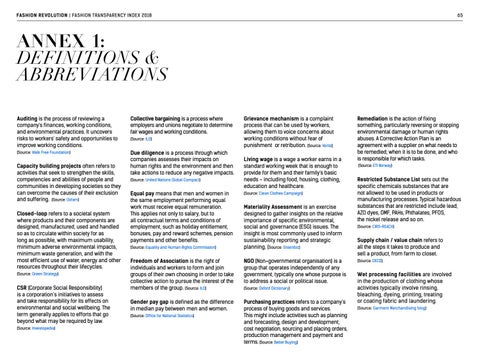FASHION REVOLUTION | FASHION TRANSPARENCY INDEX 2018
65
ANNEX 1: DEFINITIONS & ABBREVIATIONS Auditing is the process of reviewing a company's finances, working conditions, and environmental practices. It uncovers risks to workers' safety and opportunities to improve working conditions.
Collective bargaining is a process where employers and unions negotiate to determine fair wages and working conditions.
(Source: Walk Free Foundation)
Due diligence is a process through which companies assesses their impacts on human rights and the environment and then take actions to reduce any negative impacts.
Capacity building projects often refers to activities that seek to strengthen the skills, competencies and abilities of people and communities in developing societies so they can overcome the causes of their exclusion and suffering. (Source: Oxfam) Closed-loop refers to a societal system where products and their components are designed, manufactured, used and handled so as to circulate within society for as long as possible, with maximum usability, minimum adverse environmental impacts, minimum waste generation, and with the most efficient use of water, energy and other resources throughout their lifecycles. (Source: Green Strategy)
CSR (Corporate Social Responsibility) is a corporation’s initiatives to assess and take responsibility for its effects on environmental and social wellbeing. The term generally applies to efforts that go beyond what may be required by law. (Source: Investopedia)
(Source: ILO)
(Source: United Nations Global Compact)
Equal pay means that men and women in the same employment performing equal work must receive equal remuneration. This applies not only to salary, but to all contractual terms and conditions of employment, such as holiday entitlement, bonuses, pay and reward schemes, pension payments and other benefits. (Source: Equality and Human Rights Commission)
Grievance mechanism is a complaint process that can be used by workers, allowing them to voice concerns about working conditions without fear of punishment or retribution. (Source: Verité) Living wage is a wage a worker earns in a standard working week that is enough to provide for them and their family's basic needs - including food, housing, clothing, education and healthcare. (Source: Clean Clothes Campaign)
Materiality Assessment is an exercise designed to gather insights on the relative importance of specific environmental, social and governance (ESG) issues. The insight is most commonly used to inform sustainability reporting and strategic planning. (Source: Greenbiz)
Freedom of Association is the right of individuals and workers to form and join groups of their own choosing in order to take collective action to pursue the interest of the members of the group. (Source: ILO)
NGO (Non-governmental organisation) is a group that operates independently of any government, typically one whose purpose is to address a social or political issue.
Gender pay gap is defined as the difference in median pay between men and women.
Purchasing practices refers to a company’s process of buying goods and services. This might include activities such as planning and forecasting, design and development, cost negotiation, sourcing and placing orders, production management and payment and terms. (Source: Better Buying)
(Source: Office for National Statistics)
(Source: Oxford Dictionary)
Remediation is the action of fixing something, particularly reversing or stopping environmental damage or human rights abuses. A Corrective Action Plan is an agreement with a supplier on what needs to be remedied, when it is to be done, and who is responsible for which tasks. (Source: ETI Norway)
Restricted Substance List sets out the specific chemicals substances that are not allowed to be used in products or manufacturing processes. Typical hazardous substances that are restricted include lead, AZO dyes, DMF, PAHs, Phthalates, PFOS, the nickel release and so on. (Source: CIRS-REACH)
Supply chain / value chain refers to all the steps it takes to produce and sell a product, from farm to closet. (Source: OECD)
Wet processing facilities are involved in the production of clothing whose activities typically involve rinsing, bleaching, dyeing, printing, treating or coating fabric and laundering. (Source: Garment Merchandising blog)
